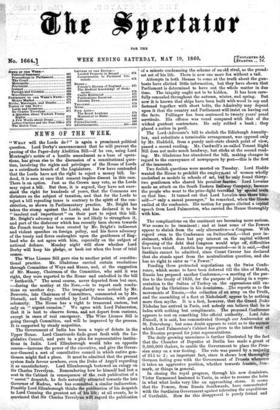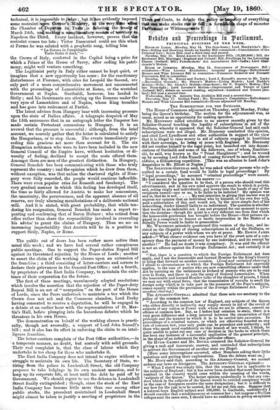The complications on the continent are becoming more serious. War
seems to be imminent ; and at least some of the Powers appear to shrink from the only alternative—a Congress. With regard even to the Conference on Switzerland,—that poor in- stalment, which does but pay interest on the capital without disposing of the debt that Congress would wipe off, difficulties have been raised. Austria has represented—so it is said,—that Sardinia cannot be admitted, since Count Cavour has declared that she stands apart from the neutralization question, and she has no right to enter as "a Power."
Pending these protracted negotiations on the Swiss Confe- rence, which seems to have been deferred till the ides of March, Russia has proposed another Conference,—a meeting of the par- ties to the treaty of 1856, for the purpose of joining in a repre- sentation to the Sultan of Turkey on the oppressions still en- dured by the Christians in his dominions. The reports as to the movements of Russia,—the collection of an army on the Pruth, and the assembling of a fleet at Nicholaieff, appear to be nothing more than myths. It is a fact, however, that the Grand Duke Nicholas has arrived in Paris, and nobody can believe that he is laden with nothing but compliments. The proposed Conference appears to rest on something like official authority. Lord John Russell, it is said, has remonstrated through our Ambassador at St. Petersburg ; but some doubt appears to exist as to the ausWer which Lord Palmerston's Cabinet has given to the latest form of the Russian proposal for joint representations.
The daily growing uneasiness is further illustrated by the fact that the Chamber of Deputies at Berlin has made a grant of 9,500,000 thalers, to enable the Government to place the Prus- sian army on a war footing. The vote was passed by a majority of 315 to 2; an important fact, since it shows how thoroughly German feeling goes with the Government of Prustda whenever it takes an aggressive position, whether towards Austria, Den- mark, or things in general. In closing the royal progress, through his new dominions, Victor Emmanuel hastened to Turin, in order to resume the helm
in what what looks very like an approaching storm. It seems that the Powers, from Russia Southwards, have remonstrated with the Sardinian Government against tolerating the expeditions of Garibaldi. How far this disapproval is purely formal and technical, it is „inwossible to judge ; but it has evidently imposed some restraint upon easuur's Ministry, at the very thine when the Chamber of Deputies in Tulin is debating the treaty of March 24th, and making a egeiptilleifitartj cession of tellitorY to Napoleon the Third. Every incident, however, proves that the restraint comes too late; Victor Emmanuel could see this when at Parma he was saluted with a prophetic song, telling him
"La Corona in Campidoglio Tutto Italia ti dara,"—
the Crown of Italy, conferred in the Capitol being a prize for which a Prince of the House of Savoy, after ceding his patri- mony, might well venture something.
The Legitimist party in Italy either cannot be kept quiet, or imagines that a new opportunity has come; for the reactionary disturbances at Florence, with cries for Leopold the Second, are only part of a more comprehensive movement not unconnected with the proceedings of Lamorioiere at Rome, or the wretched Government at Naples. Garibaldi, however, has landed. in Sicily ; and his lieutenants are stirring up the Romans under the 'Very eyes of Lamoriciere and of Naples, whose King trembles and has gone into retirement at Partici.
The latest advices from Hungary bear with increasing pressure upon the state of Italian affairs. A telegrapie despatch of May the 15th announces that in an autograph letter the Emperor has made certain Protestant concessions to Hungary. It is an avowal that the pressure is successful ; although, from the brief amount, we scarcely gather that the letter is calculated to satisfy the Hungarians, or to stop them. The events immediately pre- ceding this gracious act more than account for it The six Hungarian noblemen who were to have been included in the new General Council of the Empire have, without hesitation or di- versity of feeling, declined to accept the seats offered them. • Amongst them are men of the greatest distinction. In Hungary, General Benedek has been communicating with those who truly represent the country ; and the 'opinionwhich he drew from them, without exception, was that unless the chartered rights of Hun- gary were fully conceded, the people would continue inflexible. There were even popular cries for Kossuth and Szeohenyi. The very gradual manner in which this feeling has developed itself, the time so fairly allowed for Austria to make her concessions, the unanimity, the perseverance, and the apparent absence of all reserve, are truly alarming manifestations of a deliberate national will. And it is stated, with great probability, that while ten- dering his resignation, General Benedek has made a report re- peating and confirming that of Baron Hubner ; who retired from office rather than share the responsibility involved in overruling his advice: to grant the claims of Hungary. Thus we see an increasing improbability that Austria will be in a position to support Sicily, Naples, or Rome.
The public out of doors has been rather more active than usual this week ; and we have had several rather conspicuous public meetings. One to support the Paper-duties Repeal Bill against its threatened rejection by the House of Lords ; another to assert the claim of the working classes upon an extension of the franchise ; a third consisting of letter-carriers and sorters to declare their grievances in the General Post Office ; and a fourth, by proprietors of the East India Company, to maintain the exis- tence of their corporation for the future.
The first of these meetings, unanimously adopted resolutions which involve the assertion that the rejection of the Paper-duty Repeal Bill is an act of "usurpation" on the part of the House of Lords, since the Peers undertook to maintain a tax which the Crown does not ask and the Commons abandon, Lord Derby having consented to receive a deputation, he will be engaged in a debate at an earlier hour with the representatives of St. Mar- tin's Hall, before plunging into the hazardous debates which he threatens in his own House.
The demonstration on behalf of the working classes is practi- cally, though not avowedly, a support of Lord John Russell's bill ; and it also has its effect in enforcing the claim to an intel- ligence franchise.
The letter-carriers complain of the Post Office authorities,—in felnperate manner, no doubt, but scarcely with solid grounds. -Their real complaint is, that the class of labour which they undertake is too cheap for those who undertake it.
The East India Company does not intend to expire without a `Struggle to maintain its own life. The Secretary of State, re- tiring from the palace in Leadenhall Street, the old Company proposes to take lodgings in its own ancient mansion, and to keep up its corporate life, at least until the debt be paid off by Government. We should regret to see the debates in Leadenhall Street finally extinguished ; though, since the stock of the East India Company has become little more than one among other public stooks, the precedent maintained in Leadenhall Street might almost be taken to justify a meeting of proprietors in the Three per Cents, to debate the policy or bripolicy of everything that can make stocks rise or fall; a formidable shape of monster Parliament or Wittenageasete t



























